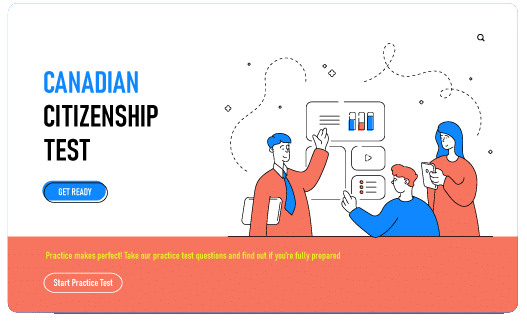Everything You Should Know For The Canadian Citizenship Test
If you are interested in becoming a Canadian citizen, you will need to pass the Canadian Citizenship Test. Below, we will tell you everything you need to know about it, including what the test entails, who needs to take the test, and what happens after taking it.
Becoming a Canadian Citizen
There are a number of benefits that come with holding Canadian citizenship. These are advantages that are not available to permanent residents, such as:
- You will be able to travel with a Canadian passport
- You have the right to run for political office
- You have the right to vote
- You get access to jobs that would otherwise be restricted

Considering this, it is not hard to see why you may be interested in becoming a Canadian citizen. However, there are some requirements you will need to fulfill. The eligibility criteria are as follows:
- You must be a permanent resident in Canada
- You must prove your language skills
- You must have filed your taxes if applicable
- You must have lived in Canada for at least three of the last five years
- You must pass a Citizenship test
We can help you to fulfill the final criteria with all of the information on this page.
What Is the Canadian Citizenship Test?
Administered by the Department of Immigration, Refugees and Citizenship Canada, the Canadian Citizenship Test is something that all Canadian citizenship applicants are required to take if they are between the age of 18 and 54-years-old and they meet the other requirements that we outlined above.
What Does the Canadian Citizenship Test Involve?
During the Canadian Citizenship Test, you will be asked 20 questions. These questions can be in a number of different formats, including:
- True or false
- Multiple choice
The judge will then determine whether or not you have answered at least 15 of the 20 questions correctly, therefore, demonstrating the knowledge required to become a Canadian citizen.
Canadian Citizenship Test Requirements
In order to take the Canadian Citizenship Test, you must have lived in Canada for three of the past five years and you must be a permanent resident. In addition to this, you must have filed your taxes if required and proven your language skills.
Location and Time
You will receive a notification regarding the date, location, and time of the test approximately one to two weeks prior to the test.
Due to the current COVID-19 regulations, all tests are being carried out online. In-person tests will likely resume in the future, but there is no date set for this. Hearings, interviews, and retests are also being carried out via video conference at present.
Get Your Test and Interview Date
The government will get in touch with you for your test and interview date. You do not need to get in touch with them.
What To Do If You Cannot Attend The Citizenship Test On The Test Date
If you are unable to attend your Canadian Citizenship Test on the date that they have requested you to do so, you will need to write to the government to explain this and the reason why you are unable to attend. This letter should be sent to the IRCC office that scheduled your initial appointment. You can either send this letter online using the web form or by email. You will then get another letter that will confirm your new appointment date.
Table of Contents
WHAT TO STUDY?
Who Has To Take The Test?
There are strict requirements in place when it comes to taking the Canadian citizenship test. It is not open to just anyone.
Who Is Eligible to Sit for the Test?
The eligibility criteria to sit the test are as follows:
- You must be a permanent resident in Canada
- You must prove your language skills
- You must have filed your taxes if applicable
- You must have lived in Canada for at least three of the last five years
If these four requirements apply to you, you will be able to take the Canadian citizenship test.
Who Is Not Eligible to Sit for the Test?
Generally, a person will not be able to take the Canadian Citizenship Test and become a Canadian citizen if they were convicted of any offence under the Citizenship Act or an indictable offence in Canada within the past four years. If you have been convicted, the best advice we can give you is to wait for four years since the date of your conviction to make an application.
What’s On The Test?
Of course, you will want to know what sort of questions you can expect on the Canadian Citizenship test so that you can be prepared.
The test is designed for you to prove that you know about Canada. Therefore, you can expect the questions to cover the responsibilities and rights of Canadians. There may also be questions about the symbols, laws, government, economy, geography, and history of Canada.
It is important to stress that this test is not used to assess your language skills in French or English.
All of the questions are based on the official citizenship study guide, which you can find here.
Format of the Test
A judge will ask you a number of questions in different formats, including multiple-choice and true or false. It is typically a written test, but it can be oral, depending on what the citizenship official decides on the day.
Number of questions
There are 20 questions, and you will need to get 15 of them correct to pass.
Duration
The Canadian Citizenship Test takes half an hour to complete.
Study For The Test
You will need to study for the test. Even if you think that you have good knowledge regarding Canada, checking the official study guide and ensuring you are prepared is critical.
How many questions: 20
How many correct answers to pass: 15
Passing score: 75%
Duration: 30 Minutes
Type: Multiple Choice
Computer-Based: YES
Preparation Materials:

How Can I Prepare For The Test?
The best resource for the Canadian Citizenship Test is Discover Canada: The Rights and Responsibilities of Citizenship, which is a study guide that has been provided by the government.
You can begin studying at any time, and the guide is free. Plus, you can study in several different formats, including:
- You can order a paper copy of the study guide
- You can download it in eBook or PDF format
- You can listen to the MP3 version
- You can read it online
This enables you to study in a manner that best suits you.
Tips For Passing The Test
 If you are planning on taking the Canadian Citizenship Test, we have a number of tips that can help you to increase your chances of passing first-time:
If you are planning on taking the Canadian Citizenship Test, we have a number of tips that can help you to increase your chances of passing first-time:
- Study ahead of time – One of the most important things to do is make sure that you study ahead of time. As mentioned, you may only receive notification of your test one week before it occurs, so leaving it until the last minute is not advised. As soon as you know you are going to be applying for Canadian citizenship, we recommend that you start the revision process.
- Try online tests – Not only can you use the official study guide that has been provided by the government to practice for the exam, but you can also try one of the many online tests that are available. It is important to stress that these tests are not official but they are based on the type of questions that you will be asked, and so they can certainly help you to get ready for your Canadian Citizenship Test.
- Read and learn the Discover Canada: The Rights and Responsibilities of the Citizenship study guide in full – We cannot stress the importance of using this as your primary study tool. It is the only official study guide for the Canadian Citizenship Test, and so you need to master this in order to give yourself the very best chance of passing your test.
Canadian Citizenship Test Day – What Happens?
The build-up to any sort of test can be nerve-wracking, which is why it is vital to be prepared.
What You Need to Bring With You
There are a number of things you will need to bring with you. This includes the following:
- A transcript, degree, diploma, or certificate that proves your French or English language skills (if you were between 18 and 54-years-old when you signed your application)
- All of your travel documents and passports that you listed on the application form, even if they have since expired
- Your permanent resident (PR) card if you have one
- The Notice to Appear, i.e. the notice asking you to take the test
- Two pieces of ID

In terms of your personal identification, one piece of ID needs to contain both your signature and your photography, such as a health care or a driver’s licence.
If you use a foreign ID document as a form of identification, this needs to be issued by the government. This is not the case for Canadian ID documents.
If your documents are not in French or English, you will need to supply a translation with an affidavit from the translator.
Rules in the test room
You will wait in the waiting room until you are called in for the test. Please conduct yourself professionally while in the test room. You should not converse during the test, nor should you eat snacks.
What happens during the test
In most cases, the test will be in written format. You will be supplied with the test and simply need to select the answers. However, your citizenship official may decide that the test will be conducted orally on the day. This may happen if you have trouble reading and writing in French or English, for example. Don’t panic if the citizenship official decides to provide you with an oral test instead of a written one. There are a number of reasons why this may happen and it will not make a difference to your chances of passing.
Test Format
After Your Canadian Citizenship Test
Once the test is done, you will no doubt be eagerly awaiting your results. Here is what to expect after the test.
After the test, you will meet with a citizenship official for an interview. This is when you will learn the results of your test.
Failure rate
The current failure rate for the Canadian Citizenship Test is 17%. This means that 83% of individuals who apply tend to pass.
If You Pass The Test
If you pass the tests, and you have met the other requirements that we have outlined above, you will be provided with a ceremony date. This will either happen when you receive your test results otherwise you will receive a date and time for your ceremony via email or letter.
What Happens If You Fail The Test?
If you do not pass your Canadian Citizenship Test, but you meet the other requirements, all hope is not lost. You can schedule another test. The second test will typically take place between four and eight weeks after the first. However, it can be longer.
If you then fail the second test, you will need to have a hearing with a citizenship official. This can last anywhere from 30 minutes to 90 minutes. The purpose of this is to determine the level of your language and your knowledge of Canada.
If you do not pass this, your application will be refused. However, this does not stop you from applying again in the future.
Oath of citizenship
The oath that new citizens of Canada take is as follows:
“I swear (or affirm) that I will be faithful and bear true allegiance to Her Majesty Queen Elizabeth the Second, Queen of Canada, Her Heirs and Successors, and that I will faithfully observe the laws of Canada and fulfil my duties as a Canadian citizen.”
So there you have it: the complete guide to the Canadian Citizenship Test. The only thing to do now is to wish you luck!

